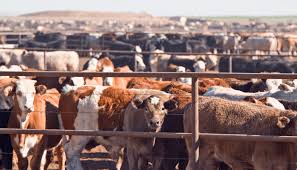Nigerian farmers have been advised to reduce their heavy use of antibiotics in livestock production to protect animal health, improve food safety, and safeguard the environment. The call was made by Dr. Habeeb Tajudeen, a Nigerian animal nutritionist, who said the future of farming must focus on sustainability rather than dependence on antibiotics.
Dr. Tajudeen explained that the global challenge of antimicrobial resistance, rising food insecurity, and the growing impact of climate change make it necessary for Nigerian farmers to change their approach to animal nutrition. According to him, farmers must start embracing innovative and science-based practices that will not only secure food production but also protect the environment.
“We are living in an era of population growth, climate change, and food insecurity, Science gives us the tools to tackle these issues, and my exploration is part of that global solution. We cannot continue to depend on antibiotics in animal production if we want to achieve food security.”
Highlighting alternatives, the animal nutritionist pointed out that black soldier fly meal and oil can be used as substitutes for soybean and tallow in livestock feed. He explained that these alternatives promote sustainable farming by converting organic waste into high-value feed, which also reduces dependence on resource-intensive crops. This practice, known as waste valorisation, helps farmers improve production while reducing environmental pressure.
Dr. Tajudeen also mentioned his ongoing research into nano-zinc and phytase, two mineral optimisation techniques that support bone health in animals and reduce harmful gas emissions from farms. He said adopting these innovations will not only improve livestock health but also reduce the negative environmental impact often linked to traditional farming practices.
He further explained that enzymes such as phytase and protease have already shown positive results in non-ruminant animal production. These multienzyme blends help farmers cut feed costs and improve nutrient digestibility, making animal farming more efficient. “My goal is to provide practical models that help farmers, feed industries, and policymakers make better decisions for both animals and the planet,” he said.
Dr. Tajudeen’s contribution to agricultural science is well recognised, as he has authored over 35 peer-reviewed publications, with 15 of them as first author. His work has continued to shape livestock feed systems and provide science-based solutions that improve productivity and promote environmental sustainability. He also serves as a peer reviewer for respected international journals, ensuring that quality agricultural research continues to spread globally.
Beyond his research, Dr. Tajudeen plays an important role in mentoring young African students. Through initiatives such as the African Union Assembly and the Korea-Africa Foundation, he supports upcoming scientists and encourages them to explore solutions for Africa’s agricultural future. His academic leadership started during his student days when he served as President of the Agricultural Technology Students’ Association at Kwara State Polytechnic and as a Senator representing the Faculty of Agriculture at the Student Union, University of Ilorin.
Stakeholders in Nigeria’s agricultural sector believe that his insights offer a clear roadmap for the country’s farmers, especially those struggling with the high cost of feed and the dangers of antibiotic overuse. His recommendations highlight how farmers can balance productivity with environmental responsibility, securing both livestock health and food system sustainability.
Farmers across Nigeria are now being encouraged to explore these alternative feed sources and innovative solutions as a way to improve the long-term viability of the livestock industry. Experts say that reducing antibiotic use will also make Nigerian agricultural exports more competitive in international markets, as many countries are already restricting the importation of meat produced with high levels of antibiotics.
Dr. Habeeb Tajudeen’s call comes at a time when Nigeria is searching for ways to expand food production and reduce reliance on imports. His message adds to ongoing discussions about sustainable agriculture, food safety, and climate-smart farming. For many farmers, his recommendations may mark the beginning of a gradual shift toward practices that protect the environment while ensuring food security for the growing Nigerian population.
